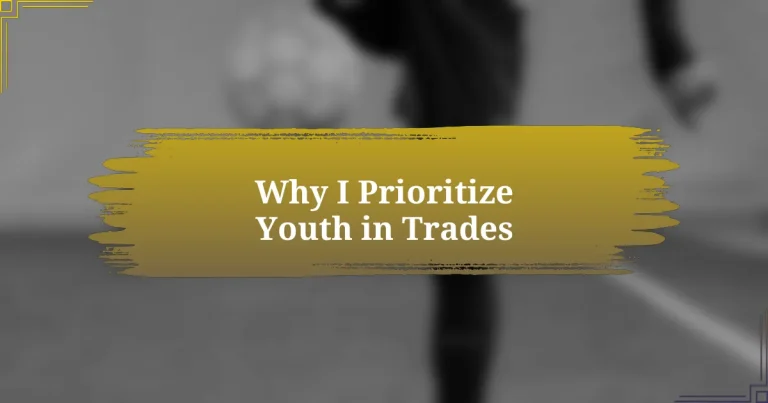Key takeaways:
- Youth in trades bring fresh perspectives and technological skills that can innovate traditional practices.
- Mentorship is crucial for fostering a sense of community and enhancing skills among young tradespeople.
- Skilled trades are essential for the economy, providing important services and fostering pride in craftsmanship.
- Resources like mentorship programs, online platforms, and local workshops can significantly support youth interested in trades.
Author: Emma Hartley
Bio: Emma Hartley is an accomplished author known for her compelling narratives that explore the complexities of human relationships and societal themes. With a background in psychology and literature, her work often fuses emotional depth with sharp wit, captivating readers around the world. Emma’s novels have earned critical acclaim and numerous awards, solidifying her place in contemporary fiction. When she’s not writing, she enjoys hiking and volunteering with local literacy programs. Emma resides in Seattle with her two rescue dogs, and she is currently working on her next novel.
Understanding youth in trades
When I think about youth in trades, I remember my first experience helping a neighbor with some basic carpentry. I was struck by how eager and capable young people can be when given the chance. Their energy is infectious, and it reminds me that every skilled tradesperson was once a novice willing to learn.
Understanding youth in trades also means recognizing the unique skills they bring to the table. For instance, many young individuals naturally gravitate towards technology, which can be a game-changer in fields like electrical work or plumbing. Have you ever considered how a digital-savvy apprentice could redefine traditional methods? Their fresh perspectives often lead to innovative solutions.
In my experience, the mentorship dynamic is crucial in shaping the future of trade workers. I’ve seen young apprentices flourish under the guidance of seasoned professionals who share their knowledge and passion. This relationship not only enhances their technical skills but also fosters a sense of community and belonging in a field that sometimes feels isolating.
Importance of skilled trades
Skilled trades are the backbone of our economy, providing essential services that keep our communities running smoothly. I recall when my car broke down; it took a skilled mechanic mere minutes to diagnose the issue and find a solution. Can you imagine life without these vital professionals? Without skilled trades, we’d face endless delays and disruptions.
One striking aspect I’ve noticed is how the craftsmanship inherent in skilled trades fosters pride and satisfaction. I remember visiting a friend’s home who had just renovated their kitchen. Watching them describe each choice—and the skills used to achieve it—showed me how invested people are in their trades. It’s not just a job; it’s a passion that spills over into their everyday lives.
Moreover, with the rise of technological advancements, the importance of skilled trades is more pronounced than ever. As someone who frequently seeks out home improvement projects, I’ve seen how tradespeople adapt and embrace new tools and methods. Have you ever thought about how this agility could transform traditional practices? It’s refreshing to witness how skilled trades can innovate while honoring their roots in craftsmanship.
Benefits of youth in trades
One of the most compelling benefits of involving youth in trades is the fresh perspective they bring to traditional practices. I remember a young plumber I met who approached pipe installation like a puzzle, using creative problem-solving to find innovative solutions that saved time and material. Isn’t it fascinating how younger generations see challenges not just as obstacles, but as opportunities for improvement and efficiency?
Additionally, youth often exhibit a strong enthusiasm for learning new technologies relevant to their trades. For instance, when I attended a workshop on advanced electrical systems, the younger participants were eager to dive into the latest software tools like it was second nature. Their engagement reminded me of how essential it is to embrace technology, ensuring that skilled trades remain relevant in a rapidly changing world.
Moreover, fostering a youthful presence in the trades can significantly enhance mentorship opportunities. I had the chance to witness a seasoned carpenter taking a newcomer under his wing, sharing not just technical skills, but life lessons learned through years of experience. How rewarding it is to see this transfer of knowledge; it enriches both the mentor’s journey and the mentee’s growth in the field.
My personal journey in trades
My journey with youth in trades began unexpectedly when I volunteered at a local vocational school. I was struck by the passion of the students; we worked on a community project, and their eagerness to learn and innovate was contagious. I couldn’t help but think about how their fresh ideas would make a significant difference in the industry, sparking my desire to support young tradespeople.
Reflecting on my own experiences, I vividly remember working alongside a young electrician who had recently entered the field. One day, as we tackled a tricky wiring issue, he suggested using a new app that helped visualize circuits. His confidence and willingness to experiment reminded me that embracing innovation often springs from a youthful perspective, pushing the boundaries of what’s possible in trades.
Over the years, I’ve also noticed how rewarding it is to watch young tradespeople develop their skills. I once mentored a teenager in carpentry, guiding him through his first significant project—building a deck. The pride he felt upon completion was profound, and it made me reflect on the deep sense of fulfillment that comes from sharing knowledge. Isn’t it incredible how these moments inspire the next generation to continue the legacy of skilled trades?
How trades impact fantasy football
Trades have a remarkable impact on the landscape of fantasy football, especially as rosters shift throughout the season. When a key player is traded, it can send ripples through the entire league, affecting fantasy team strategies instantly. I remember last season when a star wide receiver switched teams mid-way through the year. The chaos in the waiver wire was palpable, and many league managers scrambled to adjust their lineups to capitalize on their newfound potential.
Furthermore, trades can alter player performance by changing the context in which athletes operate. For example, when a young running back was traded to a team with a stronger offensive line, I saw his stats soar almost overnight. This shift not only benefited owners of that player but also shifted the strategies of those competing against him, highlighting how each trade casts a long shadow over league dynamics.
I often find myself evaluating not just the immediate effects of trades but also the long-term implications for fantasy teams. Will a veteran’s mentorship help a rookie thrive, or will the pressure weigh him down? It’s these intricacies that keep the game lively and unpredictable, making fantasy football a fascinating blend of strategy and adaptability.
Encouraging youth to pursue trades
Encouraging youth to pursue trades opens doors to a world where negotiation skills and strategic thinking can shine. I often think about how my first trade taught me the value of building relationships. It wasn’t just about making a good deal; it was about understanding another person’s needs and how we could both benefit from a trade.
It’s not just about the mechanics of trading; it’s about instilling confidence in young individuals. When I reflect on my experiences, I remember the thrill of negotiating successfully. There’s a sense of empowerment that comes from making a trade that truly benefits your team—and it’s a skill that extends far beyond fantasy football. Could helping youth to grasp this concept prepare them for more significant negotiations in their futures? I believe it certainly could.
Moreover, fostering youth interest in trading instills a sense of community and teamwork. I recall how my friends and I would engage in trade discussions, debating potential impacts and outcomes. Those discussions not only sharpened our analytical skills but created a bond that went beyond the fantasy league. Encouraging young people to participate in trades can create connections that last a lifetime, reinforcing the idea that collaboration can lead to mutual success.
Resources for youth in trades
Resources for youth interested in trades can greatly enhance their understanding and skills. One invaluable resource is mentorship programs, where experienced traders share their knowledge and experiences. I remember my early days, when a mentor guided me through complex negotiations, helping me avoid common pitfalls. Wouldn’t it be incredible if every aspiring trader had that opportunity?
Online platforms are also a treasure trove of information. For instance, I frequently turn to various forums and educational websites where youth can connect with seasoned traders. Engaging in discussions and seeking advice in these digital spaces not only sharpens their skills but builds their confidence. Have you ever wondered how much you could learn just by asking questions and absorbing the wisdom of others?
Lastly, youth can benefit from local trade clubs or workshops that promote hands-on learning. Participating in group activities allows them to practice their negotiation techniques in a supportive environment. I recall how a workshop I attended transformed my approach to trading—it was less about competition and more about collaboration. How much more effective might young traders become with similar experiences?















